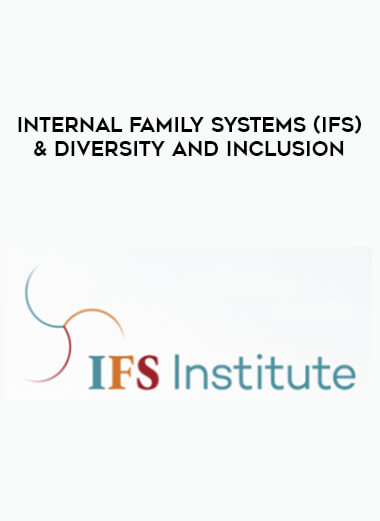Internal Family Systems (IFS) & Diversity and Inclusion
 Salepage : Internal Family Systems (IFS) & Diversity and Inclusion
Salepage : Internal Family Systems (IFS) & Diversity and Inclusion
Arichive : Internal Family Systems (IFS) & Diversity and Inclusion
Faculty:
Richard Schwartz, PhD | Kate Lingren, LICSW | Percy Ballard, MD
Duration:
14 Hours 17 Minutes
Copyright:
Jan 01, 2019
Product Code:
IRS035078
Media Type:
Online Course
In this program, we will re-affirm our goal of creating a clinical setting and community where all parts truly are welcome. This translates into Self-to-Self connection across all genders, races, religious beliefs, sexual orientations, sizes, ages, abilities, political affiliations/beliefs, class etc. Self, by as defined by the IFS model, is curiosity, compassion, caring, connection and the like and does not hold biased beliefs. Protector parts hold these biased beliefs with the intention of insuring safety in the internal system. As mental health professionals, we can help our clients parts to look toward them for safety without having to make anyone “other”, and help our clients identify their own protectors holding bias beliefs. Through identification of these parts both clinicians and patients can accept diversity and richness in ways it currently may not. Applying these tools will allow mental health providers and patients to effectively navigate an external world that is often not welcoming to all parts.
Module 1
Are All Parts Truly Welcome?
What if we could help our patients parts to look toward them for safety without having to make anyone “other?” Would you like to help your patients world reflect more diversity and richness in ways it currently may not? Would you like to help patients respond effectively in an external world that is often not welcoming to all parts?
In this first session, we will introduce the concepts of both explicit and implicit bias and how the parts that hold these known or unknown beliefs may inform our patients decisions/attitudes toward people who may be different and interfere with Self-to-Self connection.
You will:
- Experience a meditation to connect us inside and with each other
- Discuss what is implicit bias? Where do we see it in our community or clinical setting?
- Receive an introduction to the model that we call “Implicit Bias From the Outside In”
- Learn a meditation to begin to connect with our own explicit and implicitly held biased beliefs and use this as a tool help patients identify their own bias protectors.
Recording Teaching Videos
- 1.1 Introduction
- 1.2 Meditation
- 1.3. Defining Implicit Bias
- 1.4. Costs of Bias
- 1.5 How IFS Relates to Bias
- 1.6 Debrief
- 1.7 Meditation
Module 2
Protectors and Bias
In this session we as mental health professionals will begin to deepen our understanding of how our clients parts hold biased beliefs as protectors. We will demonstrate how we can access and respond to these parts within ourselves as well as with clients in Self-led ways that are potentially transformative, both internally and relationally, using the IFS model. We will use role plays and discussion to demonstrate the clinical application of the model and anchor this information internally.
In this month we will cover:
- Accessing and responding to protectors in ourselves as clinicians and for our patients
- A meditation to center inside and help clients center themselves
- The beliefs of biased protectors
Teaching VIdeos:
- 2.1 Introduction
- 2.2 Roleplay #1
- 2.3 Debrief – Roleplay #1
- 2.4 Roleplay #2
- 2.5 Debrief – Roleplay #2
- 2.6 Roleplay #3
- 2.7 Debrief – Roleplay #3
- 2.8 Meditation
Module 3
Beyond Our Limiting Beliefs
In this module we demonstrate, in the clinical setting how to work with the patient’s parts in the protective system that limit their access to Self awareness and/or keep them mired in limiting beliefs. Using a videotaped demonstration of the work, we will show the protocol that allows us to demonstrate access to biased beliefs in a safe and non-shaming way so that as therapists, we can then help these parts hold fewer obstacles for our patients to connect with others who are somehow different from them.
In this month you will learn to:
- Work with the protective system around limiting beliefs
- Use the protocol that allows access to biased beliefs
- Connect with Self across differences
Teaching videos
- 3.1 Introduction
- 3.2 Review of BFOI Model
- 3.3 Demo – Using BFOI in an IFS Session
- 3.4 Unpacking the Session
- 3.5 Meditation
Module 4
Strategies for working with Bias
In this module we will lead clinicians in a guided meditation for our patients so that they can access their own parts that hold biased beliefs. Participants will be guided in a reliable sequence to access these parts, often previously unknown to our patients. We then continue to work toward understanding the roles these parts have had in the patient’s system and why. We will demonstrate how to access the exiles these parts have been protecting in ourselves and for patients and bring them whatever help is needed, including unburdening them if possible and then unburdening their protectors. Participants will then have opportunity to process the experience in the larger group.
In this month we will cover:
- Guided meditation to access and work with implicitly held biases within ourselves
- Accessing exiles
- Closing summary of the module
Teaching VIdeos
- 4.1 Working with One’s Own Anti-Bias and Bias
- 4.2 Meditation; An Inner Exploration of Bias
- 4.3 Guidelines for Debriefing and Sharing
- 4.4 Concluding Meditation
Objectives
- Discuss the nature of implicit bias and how can it inform relationships as well as impact the clinical setting
- Describe everyday situations where we see bias in our community and its clinical implications
- Receive an introduction to the sub-model of Internal Family Systems that we call “Implicit Bias From the Outside In” for the purposes of self and client psychoeducation
- Identify and examine both outward-facing and inward-facing anti-bias parts and their role in the protective system
- Explore our own explicit and implicitly held biased beliefs and help patients identify their own bias protectors.
- Demonstrate through role play the impact of explicit and implicitly held biased beliefs and how to move through the Implicit Bias From the Outside In model to heal exiled parts and re-integrate into the inner system
- Examine through demonstrated role play the implementation of Bias From the Outside and the unburdening of exiles and internally bias parts.
- Articulate methods by which ourselves as clinicians can unblend from internal shame and judgement around biased beliefs in order to connect with clients and facilitate client engagement
- Demonstrate how to access the exiles these parts have been protecting in ourselves and for patients and bring them whatever help is needed, including unburdening them if possible and then unburdening their protectors.
Richard Schwartz, PhDRelated seminars and products
IFS Institute
Richard Schwartz began his career as a systemic family therapist and an academic and he is now on the Faculty of the Department of Psychiatry at Harvard Medical School. He is also a Senior Fellow of the Meadows treatment center in Arizona. Grounded in systems thinking, Dr. Schwartz developed the Internal Family Systems (IFS) model in response to clients’ descriptions of various parts within themselves. In 2000, he founded the Center for Self Leadership (now IFS Institute – www.ifs-institute.com), which offers three levels of trainings and workshops in IFS for professionals and the general public, both in this country and abroad. A featured speaker for national professional organizations, Dr. Schwartz has published many books and over fifty articles about IFS.
Kate Lingren, LICSWRelated seminars and products
Kate Lingren in a Licensed Independent Clinical Social Worker in private practice with over 30 years of experience. She is a Certified IFS (Internal Family Systems) therapist and on the faculty of Intimacy From the Inside Out (using IFS in couples work) as an Assistant Trainer. She is also on the faculty of Boston College School of Social Work, where she teaches a class on IFS. Most recently she has been on a quest to discover, welcome and heal her parts that hold both explicit and implicit biases in an effort to more fully embody her true Self. Kate lives and practices in the Boston area and in Martha’s Vineyard.
Percy Ballard, MDRelated seminars and products
Percy Ballard, MD is a psychiatrist who graduated from Harvard Medical School and completed general psychiatry residency training at Harvard Medical School/Cambridge Health Alliance. He completed Internal Family Systems (IFS) Level 1, 2 and 3 trainings during his residency. He has been practicing IFS psychotherapy and medication management for 9 years in the greater Boston area, including 4 years at an LGBT community healthcare center (Fenway Health). He currently practices IFS psychotherapy and psychopharmacology at Psych Garden, a team-oriented addictions-focused clinic in the Greater Boston Area. He has presented at numerous workshops and conferences on the topics of IFS psychotherapy, implicit bias, race, culture and legacy burdens, including several workshops with the founding developer of the model Richard Schwartz, PhD. Apart from therapy, he is an avid meditator in the Indo-Tibetan Buddhist traditions, a competitive martial artist of several East Asian systems, and a shameless dancer when the opportunity arises.
































Reviews
There are no reviews yet.